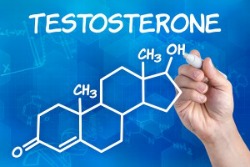Extensive advertising for testosterone replacement therapy that promises sufferers of the recently minted condition of “low-T” benefits such as weight loss, increased muscle mass, higher sexual drive, increased sexual performance and sharper mental concentration has prompted growing numbers of men to use supplemental testosterone despite not really needing to do so. A consequence of this may be more men suffering fatal heart attacks and strokes at younger ages.

The link between TRT and patient deaths is not completely clear, but growing evidence of an association has prompted the U.S. Food and Drug Association to call on companies that produce and market testosterone supplements to change what they tell potential users about the products.
In a web notice called a Drug Safety Communication, the FDA “cautions that prescription testosterone products are approved only for men who have low testosterone levels caused by certain medical conditions. The benefit and safety of these medications have not been established for the treatment of low testosterone levels due to aging, even if a man’s symptoms seem related to low testosterone.”
Products such as AndroGel, Axiron and Striant must now include labeling that highlights their indications for only medically confirmed testosterone deficiencies, as well as warnings for heart and circulatory problems. Those dangers appear related to using high doses of testosterone, indicating that men who have close to normal levels of the male hormone may be endangering themselves if they use TRT.
Testosterone has additional problems, as well. The editor of the Harvard Health blog quickly sums up the most-concerning common side effects of TRT this way: “Testosterone doesn’t immediately agree with a small number of men. They quickly develop acne, enlarged or tender breasts, or swelling in the ankles. In some men, testosterone causes an overproduction of red blood cells, which can increase the risk of developing blood clots inside arteries or veins.”
Patrick Skerrett also noted that long-term complications from ongoing use of testosterone gels, patches, tablets or injections could include more-aggressive prostate cancer and cardiovascular problems other than heart attacks or strokes. The FDA on March 3, 2015, urged drugmakers to explain these risks more clearly to both health care providers and patients.
EJL




